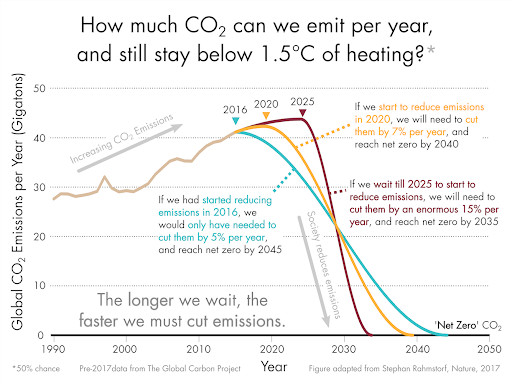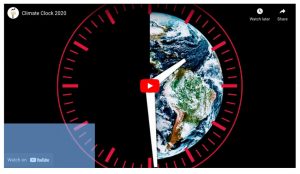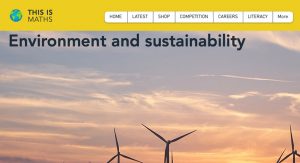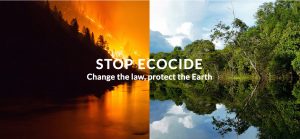https://www.youtube.com/watch?v=RfRjOB4HnqY Talk: ‘What’s causing climate change?’ with Matthew Bird As part of the ‘What’s happening to our planet?’...
Read MoreScience & solutions - why we need to act now
Climate Clock
SIGN UP TO CREATE A CLOCK FOR YOUR CITY, SCHOOL, OR COMMUNITY The Lifeline and Deadline on the...
Read MoreEnvironment: This is maths
Priory School – Environment: This is maths Students at Priory school are doing the maths on climate change...
Read MoreWeather patterns are changing
Find out how heat, rainfall and extreme weather could affect your area of the UK.
Does the technology exist to achieve net zero?
Our work clearly demonstrates that we already have the tools and technology needed to efficiently power the UK with 100% renewable energy, to feed ourselves sustainably and play our part in leaving a safe and habitable climate for our children and future generations.
The Centre for Alternative Technology (CAT) has published a report Zero Carbon Britain, as a roadmap to achieving net zero.
Building on the groundwork laid by CAT’s Zero Carbon Britain project over the last 12 years, we have incorporated the very latest developments in science and technology to update our detailed research. The report shows that we can create a Zero Carbon Britain using only proven technology.

What are young people saying?
The United Nations Youth Advisory Group on Climate Change made these recommendations for 2021
New York, 16 December – The need for greater investments in green jobs is at the top of the youth climate agenda for 2021 according to a new report, compiled by the UN Secretary General’s Youth Advisory Group on Climate Change and published today. According to the youth advisors, there is increasing anxiety among ‘Generation COVID’ about the dual climate and the youth unemployment crises, combined with a lack of prioritization in COVID stimulus packages of green jobs and a just transition to a resilient, net-zero emissions global economy. According to the report: empowering youth entrepreneurs is critical, as is holding decision-makers to account and prevent ‘greenwashing’.
• Polluter bail-outs with public money are causing widespread anger among young people, and must cease.
• A just transition to a net-zero emissions future is essential, including for communities that currently rely on fossil fuels. Instead of bailing out polluters, governments must provide resources to reskill affected workers.
• Indigenous people and local communities must have their rights respected and enforced, and be included in climate action decision-making, so their traditional knowledge can be harnessed in the fight against climate change.
• The need for climate education, including diverse perspectives, is crucial for climate action, including LGBTQ+, indigenous and traditional people, people with special needs, and refugees and displaced persons.
• Protection of forests and ecosystems is essential, as is recognizing the potential of oceans to tackle the climate crisis, including through a global network of ocean sanctuaries. Laws must be strengthened, and violations punished, under international law.
How can we involve children in the discussion?
Children are usually more informed than adults realise. It’s their future, so we need to listen to them, as well as explaining.
Advice for parents
Remember that you do not need to be a climate expert It’s OK to explore learning together. If your child asks a question you can’t answer immediately, respond by saying: “What a great question. Let me look into that so I can answer it properly.”
Try to validate, rather than minimise, children’s emotions If children express anxiety, it’s much better to say: “It’s OK to feel worried. Here is what we can do about it,” than to say: “Don’t worry. It’s all fine.” But always try to support this emotion with suggestions for positive action.
Negative information hits harder Bad or threatening facts tend to resonate more strongly – and therefore stick in the mind. So try to balance one piece of negative news with three pieces of positive news. Have some examples of good climate-related news ready – for example, successful conservation projects.
For younger children, keep it local and tangible Suggest litter picks and school events. For teenagers, encourage them to stay connected at a wider level – help them write to their MP, take part in protests and join local communities and campaigns.
Set practical goals as a family and follow through Record and celebrate your climate successes together (even a piece of paper on the fridge door). Reinforce the message that small actions can make a big difference.
Source: The Guardian Overwhelming and terrifying impact of climate crisis on mental health
For information for children see
Priory School maths and the environment
National Geographic Talking to your kids about climate change
How can we change our systems?
“The rules of our world are laws, and they can be changed. Laws can restrict or they can enable. What matters is what they serve. Many of the laws in our world serve property – they are based on ownership. But imagine a law that has a higher moral authority… a law that puts people and planet first. Imagine a law that starts from first do no harm, that stops this dangerous game and takes us to a place of safety….”
Polly Higgins, 2015
“We need to change the rules.”
Greta Thunberg, 2019
A French Citizens’ Assembly in 2020 proposed an ecocide law as one of its recommendations.
The climate convention made headlines with recommendations such as making ecocide a crime; enshrining climate goals into the French constitution; banning domestic flights on journeys that can be done by train in under two and a half hours; cutting VAT on train tickets and making a vegetarian option compulsory in public catering. But it also showed how, against a collapse of trust in traditional politics, directly involving citizens could improve community cohesion and reinvigorate democracy both locally and nationally. Macron pledged to put the key proposals to a referendum by 2021.
What about economic systems?
There are many different models for economic systems which do not exploit our planet. Doughnut economics is explained in this series of animations:




